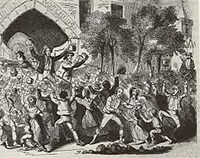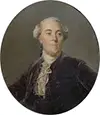The French King Louis XVI
Part 2: Money, Money, Money

Despite Turgot's opposition, the king firmly approved of aiding the American rebels, not least because their enemy was Great Britain. France sent guns, ammunitions, and supplies–secretly at first. After the American victory at Saratoga in 1777, Louis XVI, thanks in no small part to the intense lobbying of noted American polymath Benjamin Franklin, agreed to the Treaty of Alliance, which brought France into the war on the side of America. Naturally, that escalation of involvement had a cost, in terms of men and matériel required. The royal treasury took yet another hit. The French government also had other anti-British aims. Hoping to regain some of the territories and prestige lost in the Seven Years War, France in the early 1780s formed agreements with anti-British elements in India and Vietnam. One proposal by Turgot that seriously angered much of the upper classes was the abolition of the corvée, a system of compulsory unpaid labor that had been a mainstay of feudal Europe and, in fact, dated to the late Roman Empire. In medieval times, the lord of a manor could dictate the terms of such labor. This system in France included the royal directive of peasants, including work on public roads. 
Turgot had shown a firm hand in suppressing a number of bread riots, after a terrible harvest in 1774 had resulted in a rise in the price of bread and a consequent increase in the level of social distress. He had come under fire earlier for attempts to establish free trade for grain, which the nobility and, indeed, the rest of the royal council opposed. In 1776, Turgot issued the Six Edicts, of which the suspension of the corvée was one. Four of the other edicts made few waves with his opponents. The sixth did away with two prime privileges enjoyed by the guilds. Turgot had as a very ambitious goal the elimination of privilege altogether and the institution of taxation across all three of France's Estates. Such an idea would have been very popular with peasants certainly but also with the philosophes and other champions of equality. With the rich and powerful, however, it was a bridge too far. Parlement refused to countenance such a proposal. That was enough to convince the king to remove Turgot as chief minister of finance. 
Taking over that post was the Swiss banker Jacques Necker (left), in June 1777. He, too, implemented reforms, in order to restore some semblance of normality to the government's increasingly chaotic spending. What Turgot and then Necker discovered was that the young king and his wife were profligate spenders. The king liked to ride horses and to live in palaces, and he spent a lot of money on both; the queen was very fond of lavish clothes and parties and extravagant furnishings and spent a lot money on all three. The country was still facing an enormous amount of war debt from the recent conflicts and was at the moment helping finance another one, in North America. Necker tried to stem the tide by turning to loans, municipal bonds, and indirect taxes, rather than instituting another new tax or raising existing ones. One thing that Necker hadn't been granted was a seat on the Royal Council. He was operating as the country's financial officer but was not a government minister in title. He implored the king to so name him several times, but each time Louis demurred. Necker in early 1781 revealed to the king his annual report on the budget. It wasn't a pretty picture. Necker again asked to be a member of the Royal Council; the king again refused. In desperation, Necker published the Compte rendu au roi, so the realm could know the state of the king's finances. Louis dismissed Necker as head of the finance in 1783. His replacement, Charles Alexandre de Calonne, tried to spend his way out of the financial crisis, but that, too, failed. |
|
Social Studies for Kids
copyright 2002–2026
David White



 Because of his youth and inexperience in such matters, Louis XVI entrusted the running of the country's finances to Anne-Robert-Jacques Turgot (right), who had served under his grandfather, including a long stint as an intendant (tax collector). Turgot took over the post of comptroller general of finance in 1774. He had introduced some reforms under Louis XV and had helped the country weather the famine of 1770–1771. He ruled the finance department with an iron fist and introduced a handful of policies that angered the nobility. He had little support among his fellow ministers for much of his reign. Among other things, he opposed the Crown's support of the rebellious American colonies during the
Because of his youth and inexperience in such matters, Louis XVI entrusted the running of the country's finances to Anne-Robert-Jacques Turgot (right), who had served under his grandfather, including a long stint as an intendant (tax collector). Turgot took over the post of comptroller general of finance in 1774. He had introduced some reforms under Louis XV and had helped the country weather the famine of 1770–1771. He ruled the finance department with an iron fist and introduced a handful of policies that angered the nobility. He had little support among his fellow ministers for much of his reign. Among other things, he opposed the Crown's support of the rebellious American colonies during the 
